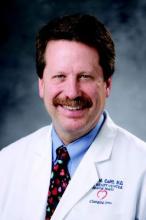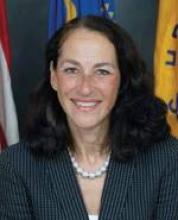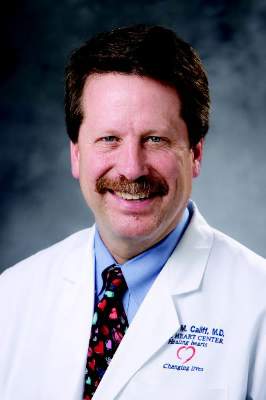User login
In his new role as deputy commissioner for medical products and tobacco for the Food and Drug Administration, cardiologist Dr. Robert Califf plans to tackle a number of emerging public health and biomedical science issues, including 21st-Century Cures, Big Data, and precision medicine.
“What is especially interesting right now is that there a number of key issues that the FDA needs do deal with,” Dr. Califf said during a press teleconference. “There are so many critical issues where there’s not a single right answer, but there’s a balance that needs to be struck. It’s a great opportunity to help shape these concepts in a broad way.”
The FDA on Jan. 26 announced that Dr. Califf would take on the role of FDA deputy commissioner for medical products, a position that has been vacant since 2013. Dr. Califf is currently vice chancellor of clinical and translational research and professor of medicine in the division of cardiology at Duke University, Durham, N.C. He plans to take a 2-year leave of absence from Duke when he begins his new position in late February.
In his new role, Dr. Califf, a master of the American College of Cardiology, will provide executive leadership to the FDA’s Center for Drug Evaluation and Research, the Center for Biologics Evaluation and Research, the Center for Devices and Radiological Health, and the Center for Tobacco Products, according to a Jan. 26 announcement by FDA Commissioner Margaret A. Hamburg. Dr. Califf will begin his new role in late February.
“I am delighted to announce this important addition to FDA’s senior leadership team,” Dr. Hamburg said in the statement. “Dr. Califf’s deep knowledge and experience in the areas of medicine and clinical research will enable the agency to capitalize on, and improve upon, the significant advances we’ve made in medical product development and regulation over the last few years.”
As part of his new position, Dr. Califf will also oversee the FDA’s Office of Special Medical Programs and play a critical role in providing high-level advice and policy direction on the agency’s medical product and tobacco priorities, according to the announcement. Additionally, he will manage cross-cutting clinical, scientific, and regulatory initiatives for the agency, including personalized medicine, orphan drugs, pediatric science, and the advisory committee system.
Dr. Califf said he is excited to take on the position during the rapidly changing landscape of health care delivery and scientific advancements. For example, he noted the progress being made in medical data collection and utilization of that information.
“We’re just entering this amazing era of Big Data,” he said during the press conference. “You have multiple dimensions of data on a scale that we’ve never seen before and the question of how to sort out true signal from noise is just a great challenge.”
Dr. Califf acknowledged that he has some learning ahead of him to get up speed on the position, especially when it comes to tobacco.
“As a cardiologist, I’ve only had one theme with tobacco, which is ‘don’t smoke,’ ” he said. “I need a very rapid education about the specifics of tobacco. It’s a very complex issue. I’m not coming in from the outside to tell the center directors what to do. I’m really there to support them.”
Dr. Califf has held multiple roles at Duke, including director of the Duke Translational Medicine Institute and founding director of the Duke Clinical Research Institute. He is one of the Top 10 most-cited medical authors with more than 1,200 peer-reviewed publications, according to a Jan. 26 statement released from Duke. He is also an internationally recognized expert in cardiovascular medicine and health outcomes research and played a pivotal role in the development and leadership of the national Patient-Centered Outcomes Research Network. The network is designed to enhance the quality and relevance of clinical evidence used to guide health decisions.
Dr. Califf is currently a member of the Institute of Medicine (IOM) Policy Committee and a liaison to the IOM’s Forum in Drug Discovery, Development, and Translation. He was formally a member of the IOM committees that recommended Medicare coverage of clinical trials and the removal of the dietary supplement ephedra from the market, and a former member of the IOM’s Committee on Identifying and Preventing Medication Errors. In addition, he served on the FDA’s Cardiorenal Advisory Panel and on the Science Board’s Subcommittee on Science and Technology that reviewed the FDA in 2007.
The transition from academia to a regulatory agency will no doubt be challenging, Dr. Califf said. He joked that the hardest part may be not saying what’s on his mind immediately. However, overall, he said he is ready for change.
“Obviously, when you’re on the regulatory side, you have the ultimate responsibility for the public health and not just the well-being of the product you’re interested in,” he said. But “I have spent so much time on all sides of the FDA that I feel pretty comfortable with what the role is going to be.”
Dr. Stephen Spielberg last held the position of FDA deputy commissioner for medical products, serving from 2011 to 2013.
On Twitter @legal_med
In his new role as deputy commissioner for medical products and tobacco for the Food and Drug Administration, cardiologist Dr. Robert Califf plans to tackle a number of emerging public health and biomedical science issues, including 21st-Century Cures, Big Data, and precision medicine.
“What is especially interesting right now is that there a number of key issues that the FDA needs do deal with,” Dr. Califf said during a press teleconference. “There are so many critical issues where there’s not a single right answer, but there’s a balance that needs to be struck. It’s a great opportunity to help shape these concepts in a broad way.”
The FDA on Jan. 26 announced that Dr. Califf would take on the role of FDA deputy commissioner for medical products, a position that has been vacant since 2013. Dr. Califf is currently vice chancellor of clinical and translational research and professor of medicine in the division of cardiology at Duke University, Durham, N.C. He plans to take a 2-year leave of absence from Duke when he begins his new position in late February.
In his new role, Dr. Califf, a master of the American College of Cardiology, will provide executive leadership to the FDA’s Center for Drug Evaluation and Research, the Center for Biologics Evaluation and Research, the Center for Devices and Radiological Health, and the Center for Tobacco Products, according to a Jan. 26 announcement by FDA Commissioner Margaret A. Hamburg. Dr. Califf will begin his new role in late February.
“I am delighted to announce this important addition to FDA’s senior leadership team,” Dr. Hamburg said in the statement. “Dr. Califf’s deep knowledge and experience in the areas of medicine and clinical research will enable the agency to capitalize on, and improve upon, the significant advances we’ve made in medical product development and regulation over the last few years.”
As part of his new position, Dr. Califf will also oversee the FDA’s Office of Special Medical Programs and play a critical role in providing high-level advice and policy direction on the agency’s medical product and tobacco priorities, according to the announcement. Additionally, he will manage cross-cutting clinical, scientific, and regulatory initiatives for the agency, including personalized medicine, orphan drugs, pediatric science, and the advisory committee system.
Dr. Califf said he is excited to take on the position during the rapidly changing landscape of health care delivery and scientific advancements. For example, he noted the progress being made in medical data collection and utilization of that information.
“We’re just entering this amazing era of Big Data,” he said during the press conference. “You have multiple dimensions of data on a scale that we’ve never seen before and the question of how to sort out true signal from noise is just a great challenge.”
Dr. Califf acknowledged that he has some learning ahead of him to get up speed on the position, especially when it comes to tobacco.
“As a cardiologist, I’ve only had one theme with tobacco, which is ‘don’t smoke,’ ” he said. “I need a very rapid education about the specifics of tobacco. It’s a very complex issue. I’m not coming in from the outside to tell the center directors what to do. I’m really there to support them.”
Dr. Califf has held multiple roles at Duke, including director of the Duke Translational Medicine Institute and founding director of the Duke Clinical Research Institute. He is one of the Top 10 most-cited medical authors with more than 1,200 peer-reviewed publications, according to a Jan. 26 statement released from Duke. He is also an internationally recognized expert in cardiovascular medicine and health outcomes research and played a pivotal role in the development and leadership of the national Patient-Centered Outcomes Research Network. The network is designed to enhance the quality and relevance of clinical evidence used to guide health decisions.
Dr. Califf is currently a member of the Institute of Medicine (IOM) Policy Committee and a liaison to the IOM’s Forum in Drug Discovery, Development, and Translation. He was formally a member of the IOM committees that recommended Medicare coverage of clinical trials and the removal of the dietary supplement ephedra from the market, and a former member of the IOM’s Committee on Identifying and Preventing Medication Errors. In addition, he served on the FDA’s Cardiorenal Advisory Panel and on the Science Board’s Subcommittee on Science and Technology that reviewed the FDA in 2007.
The transition from academia to a regulatory agency will no doubt be challenging, Dr. Califf said. He joked that the hardest part may be not saying what’s on his mind immediately. However, overall, he said he is ready for change.
“Obviously, when you’re on the regulatory side, you have the ultimate responsibility for the public health and not just the well-being of the product you’re interested in,” he said. But “I have spent so much time on all sides of the FDA that I feel pretty comfortable with what the role is going to be.”
Dr. Stephen Spielberg last held the position of FDA deputy commissioner for medical products, serving from 2011 to 2013.
On Twitter @legal_med
In his new role as deputy commissioner for medical products and tobacco for the Food and Drug Administration, cardiologist Dr. Robert Califf plans to tackle a number of emerging public health and biomedical science issues, including 21st-Century Cures, Big Data, and precision medicine.
“What is especially interesting right now is that there a number of key issues that the FDA needs do deal with,” Dr. Califf said during a press teleconference. “There are so many critical issues where there’s not a single right answer, but there’s a balance that needs to be struck. It’s a great opportunity to help shape these concepts in a broad way.”
The FDA on Jan. 26 announced that Dr. Califf would take on the role of FDA deputy commissioner for medical products, a position that has been vacant since 2013. Dr. Califf is currently vice chancellor of clinical and translational research and professor of medicine in the division of cardiology at Duke University, Durham, N.C. He plans to take a 2-year leave of absence from Duke when he begins his new position in late February.
In his new role, Dr. Califf, a master of the American College of Cardiology, will provide executive leadership to the FDA’s Center for Drug Evaluation and Research, the Center for Biologics Evaluation and Research, the Center for Devices and Radiological Health, and the Center for Tobacco Products, according to a Jan. 26 announcement by FDA Commissioner Margaret A. Hamburg. Dr. Califf will begin his new role in late February.
“I am delighted to announce this important addition to FDA’s senior leadership team,” Dr. Hamburg said in the statement. “Dr. Califf’s deep knowledge and experience in the areas of medicine and clinical research will enable the agency to capitalize on, and improve upon, the significant advances we’ve made in medical product development and regulation over the last few years.”
As part of his new position, Dr. Califf will also oversee the FDA’s Office of Special Medical Programs and play a critical role in providing high-level advice and policy direction on the agency’s medical product and tobacco priorities, according to the announcement. Additionally, he will manage cross-cutting clinical, scientific, and regulatory initiatives for the agency, including personalized medicine, orphan drugs, pediatric science, and the advisory committee system.
Dr. Califf said he is excited to take on the position during the rapidly changing landscape of health care delivery and scientific advancements. For example, he noted the progress being made in medical data collection and utilization of that information.
“We’re just entering this amazing era of Big Data,” he said during the press conference. “You have multiple dimensions of data on a scale that we’ve never seen before and the question of how to sort out true signal from noise is just a great challenge.”
Dr. Califf acknowledged that he has some learning ahead of him to get up speed on the position, especially when it comes to tobacco.
“As a cardiologist, I’ve only had one theme with tobacco, which is ‘don’t smoke,’ ” he said. “I need a very rapid education about the specifics of tobacco. It’s a very complex issue. I’m not coming in from the outside to tell the center directors what to do. I’m really there to support them.”
Dr. Califf has held multiple roles at Duke, including director of the Duke Translational Medicine Institute and founding director of the Duke Clinical Research Institute. He is one of the Top 10 most-cited medical authors with more than 1,200 peer-reviewed publications, according to a Jan. 26 statement released from Duke. He is also an internationally recognized expert in cardiovascular medicine and health outcomes research and played a pivotal role in the development and leadership of the national Patient-Centered Outcomes Research Network. The network is designed to enhance the quality and relevance of clinical evidence used to guide health decisions.
Dr. Califf is currently a member of the Institute of Medicine (IOM) Policy Committee and a liaison to the IOM’s Forum in Drug Discovery, Development, and Translation. He was formally a member of the IOM committees that recommended Medicare coverage of clinical trials and the removal of the dietary supplement ephedra from the market, and a former member of the IOM’s Committee on Identifying and Preventing Medication Errors. In addition, he served on the FDA’s Cardiorenal Advisory Panel and on the Science Board’s Subcommittee on Science and Technology that reviewed the FDA in 2007.
The transition from academia to a regulatory agency will no doubt be challenging, Dr. Califf said. He joked that the hardest part may be not saying what’s on his mind immediately. However, overall, he said he is ready for change.
“Obviously, when you’re on the regulatory side, you have the ultimate responsibility for the public health and not just the well-being of the product you’re interested in,” he said. But “I have spent so much time on all sides of the FDA that I feel pretty comfortable with what the role is going to be.”
Dr. Stephen Spielberg last held the position of FDA deputy commissioner for medical products, serving from 2011 to 2013.
On Twitter @legal_med


